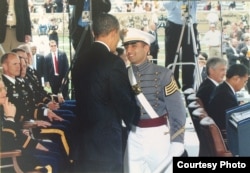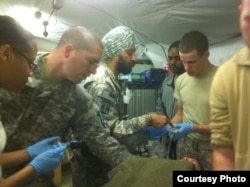When he took off his turban and shaved his beard upon entering the U.S. Military Academy at West Point, Captain Simratpal Singh thought he could not serve in the U.S. Army, while keeping articles of his Sikh religion.
The day of that difficult choice, the young cadet vowed he would find a way to come back to his faith.
"It was an excruciating experience and an excruciating decision to make, and the only way I could justify it then was that promise I made to myself. And to be honest with you, I wouldn't want any kid to have to go through that," Singh told VOA.
Singh went on to graduate from West Point and was commissioned in 2010. He became an Army Ranger and deployed to Afghanistan in 2012, receiving a Bronze Star for his service, all while adhering to the Army's grooming and appearance standards.
Then, during a Pentagon celebration marking the Sikh festival of Vaisakhi last year, he looked around the room and saw Sikh service members in uniform with turbans and beards; they had sought and won a waiver.
The now-captain applied for a religious accommodation, and this March it was granted. A decade after entering West Point, Singh has regrown his beard and proudly wears a turban.
"Ten years later, to have that promise fulfilled, to be true to myself, is a pretty extraordinary feeling," he said.
Fighting for change
The road to inclusion was not a short or easy one for Singh and three other U.S. soldiers who recently received temporary waivers, after filing legal claims against the U.S. Department of Defense.
The exemptions will be up for review and could be voided at any time.
Attorney Amandeep Sidhu with McDermott Will & Emery represented the four, along with co-counsel the Sikh Coalition and the Becket Fund for Religious Liberty.
Sidhu says Sikh service members must display "proof of concept" to the Army that keeping their turban, beard and long hair has no effect on unit readiness, cohesion and morale, as well as health and safety standards.
"We felt we would take this in a slow and deliberate approach to prove the concept that, yes, Sikhs have served in the U.S. military, but we will prove it to you again," Sidhu noted. "And these guys will deploy to Afghanistan, and they will seal their gas masks and they will wear helmets and they will wear a camouflage turban when it's necessary to match their uniform."
Sidhu and co-counsel Eric Baxter push back at the Army's uniformity argument, noting how the U.S. military has become increasingly diverse and the onus for inclusion should rest on the Army and not the individual soldier.
"Whenever the Army has had to expand to include minorities, or women or others, you don't say, ‘Let's see if this upsets the soldiers.’ You tell the other soldiers to get in line and respect all Americans and their willingness to serve," the Becket Fund's Baxter said.
History of military service
Sikhs with turbans and beards served in the American military for decades without issue, prior to grooming standards that went into effect in the 1980s.
"During World Wars I and II, 80,000 Sikh soldiers died serving alongside allied forces. Those 80,000 soldiers did not have to get an accommodation to serve. They died, they gave their blood, sweat and tears so that we can be free today," Major Kamal Kalsi said.
For Kalsi, it took 50 congressional signatures and 15,000 petitioners in a letter to the defense secretary to obtain an accommodation in 2009.
Facts About Sikhism
Facts About Sikhism
* World's fifth-largest religion, more than 25 million followers
* Monotheistic, originated in Punjab, India, more than 500 years ago with Guru Nanak, first prophet. Nine gurus, "enlighteners," have followed.
* Articles of faith include unshorn hair (kesh) to symbolize harmony with God, steel bracelet (kara), ceremonial dagger (kirpan), small comb (kanga) and undergarment shorts (kachera)
* Turbans worn as commitment to faith
* Belief in absolute equality, social welfare and fight against injustice as sacred duties
— from Sikh Coalition, Reuters, Religion News Service
The emergency room physician notes the countless Sikhs who serve without restrictions in countries like Britain, India, Australia and Canada — where the defense minister, Harjit Sajjan, is Sikh and wears a turban.
Kalsi received a Bronze star for his service in Afghanistan's Helmand province in 2011 for treating dozens of fellow soldiers and civilians wounded in fighting.
"When a soldier came to me and they were shot and they were bleeding or an IED blew up and they had an amputated arm or leg and I had to take care of them, they never said, ‘Hey what religion are you?'" Kalsi noted.
For his part, Singh says his peers and command have been nothing but supportive.
"I am another officer in the battalion and all they care about is how I am doing my job," Singh said.
Kalsi, Singh and other Sikh soldiers hope the temporary waivers slowly chip away at the current policy and eventually pave the way for permanent regulations allowing Sikh Americans to enlist without having to choose between their country and their faith.
"Our armed forces have always been at the forefront of creating change in society, and it only makes sense now that the military reflects the diversity of our nation," Singh said.
"I think we are a little bit closer to that, and hopefully we will keep making progress."








